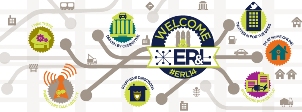ER&L Conference Sees Rapid Growth
 The ninth annual Electronic Resources & Libraries (ER&L) conference this year hosted more than 650 attendees from 40 states and six countries, representing a spike in attendance of more than 20 percent compared with 2013. Online viewership of the conference’s sessions rose significantly as well, with more than 50 U.S. academic libraries registering for ER&L Online. Registrants for the online conference had access to three simultaneous presentation tracks, adding up to dozens of hours of content over the course of the three day show.
The ninth annual Electronic Resources & Libraries (ER&L) conference this year hosted more than 650 attendees from 40 states and six countries, representing a spike in attendance of more than 20 percent compared with 2013. Online viewership of the conference’s sessions rose significantly as well, with more than 50 U.S. academic libraries registering for ER&L Online. Registrants for the online conference had access to three simultaneous presentation tracks, adding up to dozens of hours of content over the course of the three day show.
Organizers had noticed growing interest in the show as early as last fall.
“We knew something was up when we had our call for proposals, and [it] yielded about a 95 percent increase in proposal submissions,” ER&L founder Bonnie Tijerina said in her opening remarks on Monday, March 17. Participation in the community voting process used to select presentations and panels from these proposals rose sharply as well, from 450 voters for the 2013 conference, to more than 700 for this year’s show.
This “led to a lot more work for our program planners, but wow, was it worth it,” Tijerina said. “This allowed us to hand pick some really great sessions and to merge [similar] presentations.”
UX Day Debuts
One new component of this year’s show was “UX Day at ER&L” on Tuesday, March 18. With special presenters Susie Herbstritt, senior interaction designer for Dell; Brian Taylor, senior user experience researcher and designer for Dell; and Matt Franks, Professor at the Austin Center for Design and product owner and lead interaction designer at MyEdu, UX Day included a track of user experience-related sessions, featured a hands-on workshop led by UX for Good founders Jason Ulaszek and Jeff Leitner, and TEDxAustin Executive Producer Nancy Giordano.
“So much knowledge is now being disseminated via TED. So what is the role of libraries, since they have essentially been removed from the equation of spreading the latest ideas and knowledge to users? Is there some way to work together with TED or work locally to connect the ideas at TED to libraries?” Tijerina explained to LJ the central theme of the workshop. Group brainstorming sessions resulted in a variety of ideas, such as TED US, a concept that would have libraries help break the “cult of individuality” around TED Talks, delving deeper into a subject by highlighting the people whose work and ideas support a prominent speaker. Other suggestions included detecting the location of TED Talk viewers in order to suggest topical books or other resources available at their local library, or harnessing the capabilities of TED’s production staff to help librarians learn to make high-quality videos featuring experts on subjects of local interest.
Practical Knowledge
ER&L 2014 featured almost 90 presentations, panels, and workshops organized into eight tracks, ranging from e-resource management and collection development, to emerging technologies and the library as publisher trend. Many focused on specific case studies or offered practical, applicable advice, such as a panel discussion on building electronic resource management (ERM) systems using alternative tools like Google Sites or Microsoft CRM, a nuts-and-bolts panel on EZproxy administration, and a presentation on the benefits and drawbacks of a collection budget management strategy involving the cancellation of electronic journals and purchase of individual articles.
“There are many situations [in which] you are the technology experts in your libraries, the people who have done the most to further our missions by making technology work invisibly,” librarian, author, and LJ columnist Barbara Fister said during her keynote presentation. “Your work isn’t really about technology. It’s about much more. It’s about what we can do with our tools to make our libraries better. To make our communities better. To make each other better at connecting people with ideas, and helping them make their own ideas public.”
In addition to Fister’s opening keynote, Sarah Durrant, principal of Red Sage Consulting presented Tuesday’s plenary on how the emerging field of Resilience Training could benefit librarians. Brent Hecht, assistant professor of computer science and engineering at the University of Minnesota discussed the influence of User Generated Content on the Internet in his closing keynote on March 19.
Sessions recorded and streamed for the ER&L Online conference will be archived and accessible for show attendees for the next year.
RELATED
ALREADY A SUBSCRIBER? LOG IN
We are currently offering this content for free. Sign up now to activate your personal profile, where you can save articles for future viewing









Add Comment :-
Comment Policy:
Comment should not be empty !!!